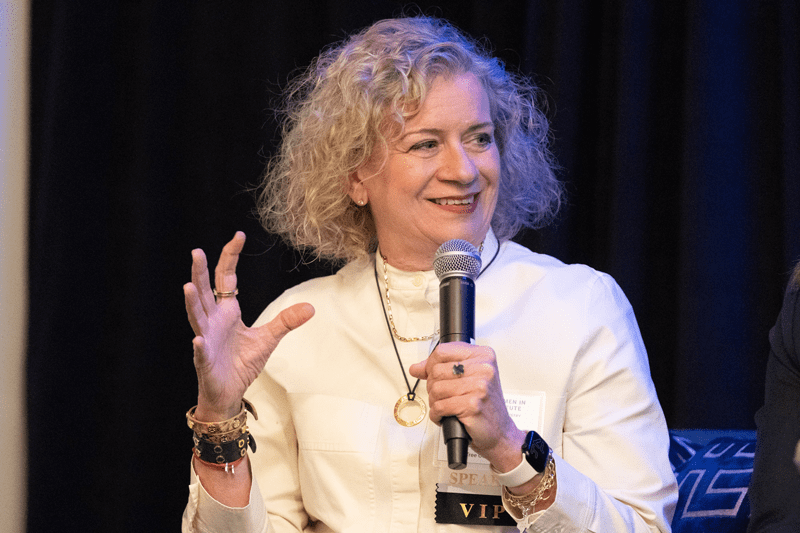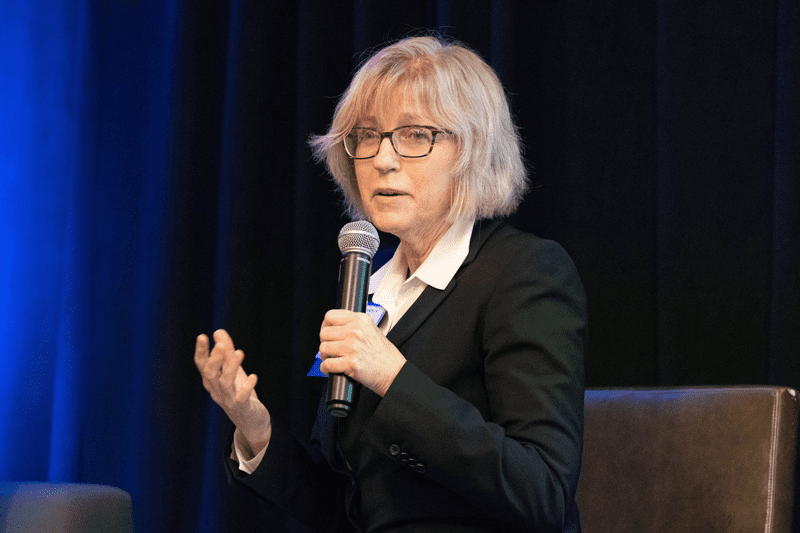I participated in a thought-provoking panel discussion at the Women in Energy Institute – Championing the Industry event, which took place at the JW Marriott hotel in downtown Houston on October 24, 2023. The panel was titled “Building Resilient and Agile Teams,” and it was a sold-out event that brought together professionals from across the energy industry, especially landman specialists, as the American Association of Professional Landmen (AAPL) was the organizer.
Joining me on the panel were two remarkable women leaders, Paula Smetana Stuart, the chief information officer (CIO) at Crescent Energy, and Kate Stevenson, the CEO and cofounder of Novus Consulting. Together, we explored the changing landscape of leadership, particularly in the context of the energy sector.
The discussion was moderated by Dr. Susan Nash, Director of Innovation of the American Association of Petroleum Geologists (AAPG). We collectively highlighted that effective leadership is not about gender but rather about qualities such as adaptability, authenticity and the ability to lead with empathy. Leadership in the energy sector, like many other industries, is evolving rapidly, and the key to success lies in staying ahead of the curve and embracing change.
Paula Smetana Stuart brought a wealth of experience from her role as the CIO at Crescent Energy. She emphasized the importance of adaptability in leadership and staying attuned to technological advancements that can drive innovation in the industry.
Kate Stevenson, CEO of Novus Consulting, shared valuable insights about the role of mentorship in leadership, underlining the significance of nurturing the next generation of leaders by building a team culture of trust, clarity and psychological safety.

One of the themes I highlighted during our discussion was the need for new leadership to address the challenges and opportunities presented by remote work. In today’s world, especially in the aftermath of the global pandemic, many employees are working remotely. This new paradigm requires leaders to be more mindful of the well-being and productivity of remote workers. A resilient and agile leader must create an environment where remote team members feel connected, supported and engaged.
I emphasized that in this era of remote work, one’s ascent in the organization often depends on the ability to produce valuable content consistently and provide reliability on results, and also to network efficiently. Remote team members can sometimes feel isolated, and it’s crucial for leaders to foster a culture of continuous learning and knowledge sharing. Networking and maintaining strong connections are equally important, as they facilitate collaboration and provide the necessary support to team members, regardless of their physical location. I am convinced a leader needs to understand the greater scene of the industry she is in, to understand the waves, and, yes, be, as our panel says, an AGILE leader.
The panel discussion concluded with a shared vision of leadership that transcends boundaries and paves the way for the energy industry’s more inclusive and equitable future. We were asked for a word to finalize the panel. These were the words:
- Paula Smetana Stuart: INTEGRATION
- Kate Stevenson: CULTURE
- Maria Angela Capello: INSPIRATION
“Building Resilient and Agile Teams” is not just a catchphrase; it’s a call to action for leaders in the energy sector. As we continue to navigate the challenges and opportunities presented by remote work, remember that resilience, agility and a commitment to content creation and efficient networking are key to effective leadership. The Women in Energy Institute’s event reminded us that leadership in the energy industry knows no gender, and anyone with the determination to excel can champion the industry, drive change, and lead with resilience and agility.
I would also like to emphasize that just as “maestro” or “actor” is preferred by women in those respective professions, instead of the accepted “maestra” and “actress,” the masculine term “landman” is traditionally used to refer to both men and women in the profession, as codified by the AAPL. This discovery was enlightening, and it’s awe-inspiring to meet many young and experienced women in this event who confidently refer to themselves by saying, “I am a landman.” May embracing male nouns be accelerators to pave the way toward the recognition that we are all equal, regardless of gender?
The Women in Energy Institute – Championing the Industry event had four tracks, with distinctive sessions in each one, mostly related to landmen specific interests or objectives.
- Land/legal
- Technical
- Leadership
- Emerging energies
I must confess that I did not know some of the terms used in several of the sessions and marveled at the topics landmen address. For example, a very-well attended session was “Three Common Title Issues Faced in Title Examination: Duhig, Trust Ownership and Affidavits of Heirship,” which was totally foreign to me. Instead, “Carbon Dioxide Transport and Sequestration in the Submerged Lands of the United States Gulf of Mexico Region” triggered my reflections about the many facets of permitting that, as a geoscientist, I can collaborate with. There is a fascinating and, in many ways, unique approach of the U.S. to the management of permits, monitoring of operations, and negotiations of acquisitions and divesting.

Director of Education and Professional Development, AAPG.
One of the things that I liked the most in this event, besides my discovery journey on landmen, was the way with which the organizers of the event also directly address the new communication styles. I was enchanted by the session “Voices of Change: A Chat With the Women Behind Flipping the Barrel Podcast,” which was smartly placed under the “Leadership” track. The session emphasized how important it is to have a presence on all social media and platforms so that messages reach out to young generations, experienced ones and society at large. The organizers of this podcast “believe in the importance of offering a woman’s perspective of the industry and having hard conversations about essential topics, such as workplace culture, talent retention, future leadership, and working motherhood.” Jamie Elrod and Massiel Diez have imprinted the podcast with a fresh outlook about why young women can and need to search for a career in oil and gas.
Many leaders with an impactful trajectory were present, and we enjoyed the genuine stories of Vicki Hollub, president and CEO of OXY, at the opening ceremony, especially as her stories were prompted by the questions of Ann Bluntzer, in what was a spontaneous conversation. I have heard Vicki Hollub on many occasions, but here it looked like she was indeed communicating without barriers, sharing her hurdles and opportunities, and letting all of us know that making it to the top as a woman is not easy – or scripted!
The International Energy Agency (IEA) maintains updated statistics regarding the gender gap in the energy sector. As of September 2022, the report indicates that women make up 39.4 percent of the workforce across the entire economic sector, with only 16.0 percent in senior leadership roles. In stark contrast, in the energy sector specifically, the numbers paint a different picture, with only 15.4 percent of women in the total workforce and a mere 14.7 percent in senior leadership roles.
A quote from the IEA’s statistical report, prominently featured in one of the many presentation slides at the Women in Energy Institute, captured the essence of the event: “Gender Diversity in the energy sector is critical to clean energy transitions.” This sentiment resonates deeply with me, and it was a privilege to attend this event, and connect with women who work in wind and solar energy plants as landmen. Yes – landMEN!
To learn more, go to:
- IEA statistics on the gender gap.
- The American Association of Professional Landmen (AAPL).
- Flipping the Barrel Podcast.
Headline photo: “Building Resilient and Agile Teams” panel speakers (L to R): Maria Angela Capello, Kate Stevenson and Paula Smetana Stuart. Photos courtesy of AAPL.
Maria Angela Capello is a renowned leader and author in the energy sector. She is a Cavaliere dell’Ordine della Stella d’Italia (Knight of the Order of the Star of Italy), the highest civil honor conferred by the President of Italy, “for her outstanding career in the energy and hydrocarbons sectors.” She is an Honorary Member of the Society of Petroleum Engineers (SPE), the top individual award of the SPE, and serves on the Board of Directors of the Society of Exploration Geophysicists (SEG). Capello is a physicist from the Universidad Simon Bolivar (Venezuela), and holds an M.Sc. from the Colorado School of Mines (USA). Her passion is to propel women and young professionals into leadership and sustainability. Capello is president at Red Tree Consulting, LLC, and can be contacted at mcapello@redtreeconsultingllc.com.
Oil and gas operations are commonly found in remote locations far from company headquarters. Now, it's possible to monitor pump operations, collate and analyze seismic data, and track employees around the world from almost anywhere. Whether employees are in the office or in the field, the internet and related applications enable a greater multidirectional flow of information – and control – than ever before.


